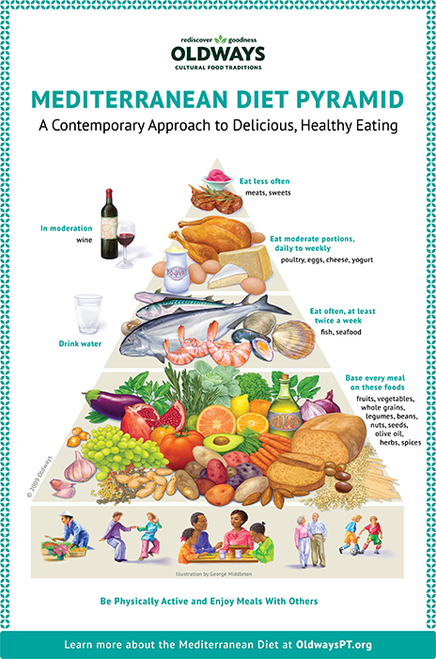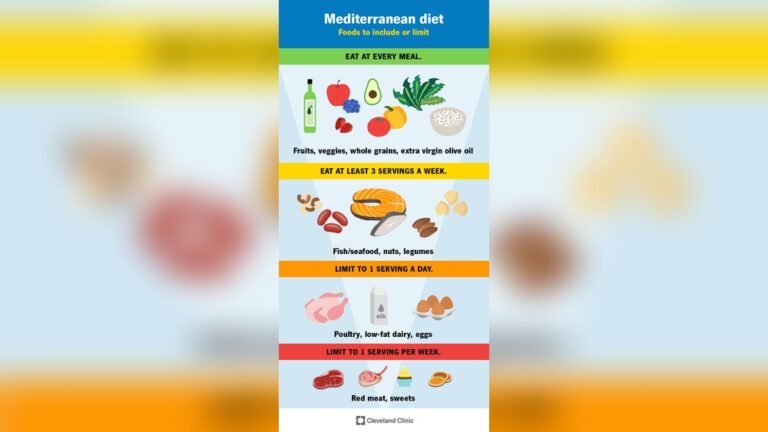Are you looking for a way to eat healthier without giving up delicious food? The Mediterranean diet might be exactly what you need.
This eating plan focuses on fresh fruits, vegetables, whole grains, nuts, and olive oil—foods that not only taste great but also boost your well-being. You’ll enjoy moderate amounts of fish, poultry, and dairy, while cutting back on red meat and sweets.
Want to know how this simple shift in your daily meals can improve your health and bring vibrant flavors to your table? Keep reading to discover a clear and easy Mediterranean diet description that can change the way you eat and feel.

Credit: my.clevelandclinic.org
Core Foods
The Mediterranean diet centers on wholesome, natural foods. Core foods are mostly plant-based. They provide essential nutrients and support overall health. This diet focuses on fresh, seasonal, and minimally processed ingredients. Each food group plays a vital role in daily meals.
Fruits And Vegetables
Fruits and vegetables form the foundation of the Mediterranean diet. They offer vitamins, minerals, and fiber. Fresh, colorful produce is preferred. Eating a variety ensures a broad range of nutrients. These foods add flavor and texture to every meal.
Whole Grains
Whole grains are a key energy source in this diet. Examples include whole-wheat bread, brown rice, and barley. They contain more fiber and nutrients than refined grains. Whole grains promote digestion and help maintain steady blood sugar. They keep you feeling full longer.
Legumes And Nuts
Legumes like beans, lentils, and chickpeas provide protein and fiber. Nuts such as almonds, walnuts, and pistachios add healthy fats. These foods support heart health and reduce inflammation. They are nutrient-dense and perfect for snacks or meals.
Olive Oil And Healthy Fats
Extra virgin olive oil is the main fat in the Mediterranean diet. It is rich in monounsaturated fats and antioxidants. Olive oil replaces butter and other unhealthy fats. Healthy fats improve cholesterol levels and support brain health. Small amounts of fatty fish also provide omega-3s.
Herbs And Spices
Herbs and spices add flavor without extra salt. Common choices include basil, oregano, rosemary, and garlic. These ingredients enhance taste and offer health benefits. They contain antioxidants and anti-inflammatory compounds. Using herbs and spices encourages healthier cooking habits.
Moderate Intake
The Mediterranean diet promotes balance by encouraging moderate intake of certain foods. These items provide important nutrients without excess calories or fats. Eating them in moderation supports overall health and adds variety to meals.
Moderate consumption helps maintain energy and heart health. It fits well with the diet’s focus on plant-based foods and healthy fats. Let’s explore key foods to enjoy in moderation.
Poultry And Eggs
Poultry and eggs are good sources of protein and vitamins. Eating them a few times each week fits the Mediterranean style. Choose lean cuts of chicken or turkey to reduce fat. Eggs provide essential nutrients and can be included regularly but not daily. This moderate intake supports muscle health without overloading saturated fats.
Low-fat Dairy
Low-fat dairy products like cheese and yogurt add calcium and probiotics. These help with bone strength and digestion. Consume these dairy items in small to moderate amounts daily or a few times per week. Opt for plain yogurt without added sugar for the best benefits. Low-fat options align with the diet’s heart-healthy goals.
Red Wine
Red wine is part of traditional Mediterranean meals. Drinking it in moderation may offer antioxidants that support heart health. Limit consumption to one glass per day for women and up to two for men. Red wine is best enjoyed with meals to aid digestion and slow alcohol absorption. Avoid excess drinking to maintain health benefits.
Foods To Limit
Limiting certain foods is important for a healthy Mediterranean diet. These foods can affect heart health and overall wellness. Reducing their intake helps maintain balance and supports the diet’s benefits.
Red Meat
Red meat should be eaten rarely, only a few times per month. It is high in saturated fats and can raise cholesterol. Choose leaner protein sources like fish or poultry instead.
Sweets And Added Sugars
Sweets and added sugars are best kept to a minimum. They can cause blood sugar spikes and weight gain. Fresh fruit is a healthier dessert choice and provides natural sweetness.
Processed Foods
Processed foods often contain unhealthy fats and excess salt. These include processed meats and refined grains. Eating less processed food supports better digestion and heart health.
Saturated Fats
Saturated fats come from butter, cream, and some oils. They can increase bad cholesterol levels. Olive oil is a healthier fat option and should replace saturated fats in the diet.
Mediterranean Cuisine
Mediterranean cuisine reflects the rich culture and history of countries surrounding the Mediterranean Sea. It is known for fresh, wholesome ingredients and simple cooking methods. This cuisine is a key part of the Mediterranean diet, praised for its health benefits and delicious flavors.
Regional Influences
Mediterranean cuisine varies by region, shaped by local traditions and climates. Coastal areas focus on seafood, while inland regions prefer meats and grains. Each country adds its unique touch, creating diverse yet connected food styles.
Countries like Italy, Greece, Spain, and Turkey offer distinct dishes. Olive oil, fresh herbs, and seasonal produce remain common throughout the region.
Signature Ingredients
Olive oil is the foundation of Mediterranean cooking. It replaces butter and other fats, adding healthy fats and flavor. Fresh vegetables like tomatoes, eggplants, and peppers are staples.
Legumes such as chickpeas and lentils provide protein and fiber. Whole grains like barley and whole wheat are common. Nuts, seeds, and fresh herbs enhance taste and nutrition.
Flavor Profiles
Mediterranean dishes balance bright, fresh, and earthy flavors. Lemon juice and garlic add zest and aroma. Herbs like oregano, basil, and rosemary give a fragrant touch.
Spices are used lightly to enhance but not overpower. The cuisine celebrates natural food tastes with simple seasoning. This leads to meals that are satisfying and healthy.
Health Benefits
The Mediterranean diet offers many health benefits. It focuses on natural, wholesome foods that support overall wellness. This diet helps protect the heart, manage weight, and reduce the risk of chronic diseases. The key is eating plenty of fruits, vegetables, whole grains, and healthy fats.
Heart Health
The Mediterranean diet promotes heart health by using olive oil as the main fat. Olive oil is rich in healthy monounsaturated fats. These fats help lower bad cholesterol and raise good cholesterol. Eating fish and nuts provides omega-3 fatty acids, which reduce inflammation and protect the heart. This diet also encourages eating more fruits and vegetables, which contain antioxidants that protect blood vessels.
Weight Management
This diet supports weight management naturally. It emphasizes whole foods that are high in fiber and nutrients. Fiber helps you feel full longer, reducing overeating. The focus on healthy fats and lean proteins keeps energy steady throughout the day. It avoids processed foods and added sugars, which often lead to weight gain. Many people find it easier to maintain a healthy weight with this balanced eating style.
Chronic Disease Prevention
The Mediterranean diet helps lower the risk of many chronic diseases. It reduces the chances of type 2 diabetes by improving blood sugar control. The diet’s antioxidants and healthy fats protect against inflammation, a root cause of many illnesses. Studies show lower rates of certain cancers and neurodegenerative diseases in people who follow this diet. Its nutrient-rich foods support a strong immune system and long-term health.

Credit: onlinelibrary.wiley.com
Meal Planning Tips
Planning meals on the Mediterranean diet is simple and flexible. Thoughtful preparation helps keep your diet balanced and exciting. Focus on fresh ingredients and mindful portions. This approach supports lasting healthy habits and enjoyable eating.
Balancing Macronutrients
Include healthy fats like olive oil and nuts in every meal. Add lean protein from fish, poultry, or legumes. Whole grains provide energy and fiber. Vegetables and fruits add vitamins and minerals. Each meal should have a mix of these macronutrients for steady energy and fullness.
Incorporating Variety
Choose different vegetables and fruits daily to get many nutrients. Rotate protein sources, such as beans, fish, and chicken. Try new whole grains like bulgur or farro. Use herbs and spices to add flavor without salt. Variety keeps meals interesting and nutritionally rich.
Sample Meal Ideas
Start with a breakfast of Greek yogurt topped with nuts and berries. Lunch can be a salad with mixed greens, chickpeas, olives, and olive oil dressing. Dinner might include grilled fish, steamed vegetables, and quinoa. Snacks like hummus with raw veggies fit well. These meals are easy and follow Mediterranean diet principles.
Lifestyle Factors
The Mediterranean diet is not just about the foods you eat. Lifestyle factors play a big role in its health benefits. These habits support long-term well-being and balance.
Living the Mediterranean way means staying active, enjoying meals with others, and paying attention to how you eat. These simple practices help improve digestion, mood, and energy.
Physical Activity
Physical activity is a daily part of life in the Mediterranean region. Walking, gardening, and light exercise keep the body moving. Regular movement helps control weight and lowers the risk of many diseases. It does not require intense workouts. Simple activities done often make a big difference.
Social Eating Habits
Eating together is a key part of the Mediterranean lifestyle. Meals are shared with family or friends. This social time encourages slower eating and better digestion. Conversations during meals create joy and reduce stress. Social eating also helps people choose healthier foods and avoid overeating.
Mindful Eating
Mindful eating means focusing on the food and the experience. It involves eating slowly and appreciating each bite. This practice helps recognize hunger and fullness signals. Mindful eating leads to better food choices and prevents overeating. It also enhances enjoyment and satisfaction from meals.

Credit: oldwayspt.org
Conclusion
The Mediterranean diet focuses on fresh, natural foods daily. It uses olive oil as the main fat source. Vegetables, fruits, whole grains, nuts, and legumes fill most plates. Fish and poultry appear often, while red meat stays rare. This diet supports heart health and overall wellness.
Eating this way feels simple and satisfying. Try adding these foods to your meals. Enjoy good taste and better health together.


